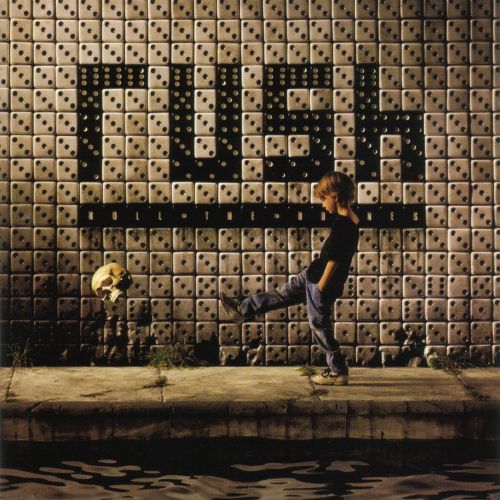
Roll the Bones (1991)

1.Dreamline
2.Bravado
3.Roll the Bones
4.Face Up
5.Where's My Thing?
6.The Big Wheel
7.Heresy
8.Ghost of a Chance
9.Neurotica
10.You Bet Your Life
One's first thought upon seeing the compact disc in the store could be, “What a dreary looking album cover!” To this day, many are still not entirely sure what they're looking at. A pale child in gothic garb seemingly kicking a skull through some windswept cave? Whatever it was, it didn’t exactly scream optimism. Fortunately, first impressions can deceive, and Roll the Bones is hardly the dark, brooding effort its artwork might suggest. Reuniting once more with co-producer Rupert Hine, the band more or less picks up where Presto left off — sonically and thematically — only this time they’ve built the album around a concept. Or, at the very least, a guiding motif: life is short, life is chaotic, so you may as well roll the dice and do your best.
And roll they do. Throughout the record, metaphors of chance, gambling, and fate appear again and again. It’s a clever premise, and rather fitting given that this album, more than most, feels like the result of some bold musical wagers. The results, however, are a mixed bag. As with most Rush albums, there’s enough good — and in places, great — material to keep the faithful satisfied. But there’s also the unmistakable sense that not all of the risks paid off.
Take the title track, Roll the Bones. A lot of fans love it. The band themselves were clearly fond of it, playing it regularly on multiple tours. But it remains one of those divisive cuts. The song’s herky-jerky arrangement, abrupt stops, and idiosyncratic time signatures don’t exactly invite repeat listens. And then there’s the rap break. Yes, Rush raps. Or rather, Geddy Lee raps — heavily processed and modulated so as to disguise his voice, but it’s him. Some claim it’s clever, others cringe. To their credit, the band pulls it off better than you might expect, but whether it works at all is still up for debate.
Elsewhere, the experimentation continues. Ghost of a Chance was released as the first single, but its wildly shifting tempo — particularly in the chorus — makes for a jarring listening experience. One moment you’re in a groove, the next you’ve slammed on the brakes. It’s frustrating, especially since the song contains one of Alex Lifeson’s finest solos. It’s a case of near brilliance undercut by clumsy execution.
There are other moments where the gamble nearly pays off. Heresy is a solid piece, a sort of musical snapshot of the collapse of global communism — still a fresh topic at the time of release. Its polished sheen arguably robs it of some urgency, but the intent is clear and admirable. You Bet Your Life is another curious number, featuring an almost sing-along chorus that catalogs a rapid-fire list of ideologies, dogmas, and beliefs. On paper, it’s thematically sound, but in practice it feels just a bit too gimmicky. One could imagine it used to sell sugar-free charm in a well-meaning commercial.
Ironically, some of the strongest material here is also the most overlooked. By this stage in their career, Rush’s catalogue was so deep that even a great new track was likely to be buried by the weight of their past. The Big Wheel, Face Up, and Neurotica all fall into this category. Each is strong in its own right, but none were destined to become setlist regulars. They’re like vintage stamps — stuck, licked once, and forgotten.
That’s not the case for Dreamline and Bravado, which lead off the record and have become the most recognizable tracks from this era. Personally, I’ve always felt they were slightly overrated, but it must be said — they absolutely soar in a live setting. And speaking of live highlights, Rush finally delivers another instrumental with Where’s My Thing?, a welcome (and overdue) return to form. It’s playful, sharp, and a reminder of what the band can do when they leave lyrics, however revered, behind.
So, credit where it’s due. Rush took some chances with this one. Roll the Bones may not top anyone’s all-time list, but it’s far from a flop. There’s enough here to admire — and enough quirks to keep things interesting. And in a career defined by fearless progression, it’s just another spin of the wheel.
Go back to the main page
Go To Next Review